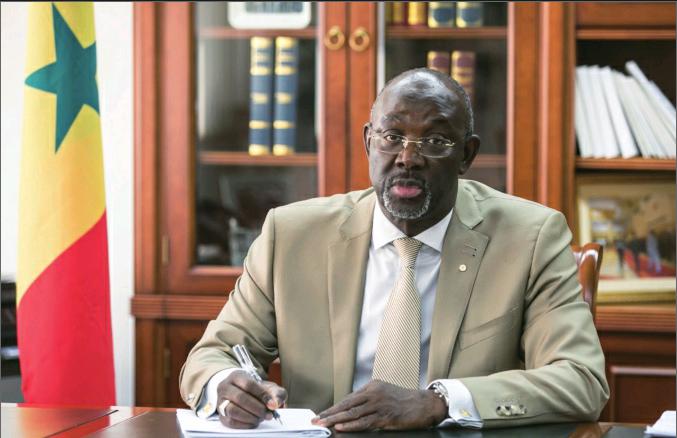ANCHOR FOR GLOBALIZATION
2017-05-27

While Senegal, like many West African countries, is not an official partner in the Belt and Road Initiative, the Senegalese Ambassador to China, Abdoulaye Fall, described to Beijing Review reporters Sudeshna Sarkar and Ge Lijun how his country can contribute to, and benefit from, the initiative. The following is an edited excerpt of the interview:
Beijing Review: How does the Belt and Road Initiative dovetail with the SinoAfrican bloc Forum on China-Africa Cooperations (FOCAC) development strategy and the African Unions (AU) development blueprint Agenda 2063?
Abdoulaye Fall: At the FOCAC Summit in Johannesburg on December 4, 2015, Chinese President Xi Jinping unveiled an ambitious program built around 10 main themes: industrialization, agricultural modernization, infrastructure, finance, green development, trade and investment facilitation, poverty eradication and peoples wellbeing, public health, people-to-people and cultural exchanges, and peace and security. There are so many common development factors with the Belt and Road Initiative. And most of these programs are also to be found in the AUs Agenda 2063.
The trajectories of China and Africa run relatively parallel in three main stages. The first is based on liberation. Like China, Africa has finally liberated itself, whether from colonialization or apartheid. Then followed a phase of integration, in which China succeeded in bringing together 56 ethnic groups. If we have achieved this on a regional scale, we must now aim to do this at the continental level through the unification process designed by the AU.
The last point is the development level that China is achieving with success, maintaining a very strong strategic partnership with Africa. This is what we must aim for and[a path where] China intends to accompany the continent through a very strong strategic partnership.
Senegal has a strategic plan for its economic and social development. The Emerging Senegal Plan is a 20-year plan issued in 2015, aiming at restructuring the economy in an inclusive and sustainable way with good governance. We want to restructure our economy to reach a minimum growth rate of 7 percent by 2018 and maintain this for at least 10 years. When the plan was initialized, the growth rate was around 4.5 percent, but in the last two years we managed 6.4 and 6.5 percent respectively, implying we are on the right track to achieve our objective.
Now, Africas priority after modernizing and boosting agriculture for food security is industrialization. Without industrialization you cannot develop your country [and this can be helped by] Chinese industries delocalizing in Africa. This is mutually beneficial because China has to delocalize. Manpower in China is becoming more and more expensive. So a product produced in China will no longer be as competitive as it used to be. Chinese enterprises have to delocalize. They have started doing this in Asia and then in Africa.
[Chinese enterprises] extended their delocalization in Ethiopia. Ethiopia stands as a success story and my country, Senegal, is now on the radar. Senegal is developing its own industrial park. The first stage is already completed. As the Chinese proverb goes, you have to build a nest to attract the phoenix.
Why havent many West African countries formally joined the Belt and Road Initiative so far?
It might be due to a lack of communication. Its possible that most of them look at the map and say, oh, we are not involved because the road begins in China and goes to Eastern Europe and to the eastern coast of Africa, targeting only a few countries. So others, namely West African countries, which face the Atlantic Ocean, might think they are not involved.
However, as has been said, nobody is or should be excluded. So if youre interested, you can also be part of the initiative. Most African countries should participate since they could benefit a great deal. The upcoming Belt and Road Forum for International Cooperation might be an additional opportunity to communicate better on this initiative and possibly attract more African nations.
Senegal has not signed an agreement so far, but I have to tell you that whenever China invites the Senegalese Government to an event, high authorities of this country attend. The initiative…wants to develop cooperation between Asia, Europe and Africa, not only politically but also commercially, financially, culturally and through infrastructure development. By placing the continent at the forefront of globalization, the initiative is beneficial for Africa in general, and for Senegal in particular.
How can West African Senegal contribute to the initiative?
The initiative is also a tool to develop inclusiveness and better anchor globalization. Senegal, located at the westernmost tip of Africa, is open and very close to international markets—mostly the West African, West European and the North and South American markets. So when you think of globalization, our location can contribute to better anchor this initiative. We also expect to benefit greatly from this initiative. So it will be win-win cooperation.
If production capacity is developed in our country and if large-scale investors come, they generate foreign direct investment that is instrumental to our development process. We can create new jobs because of this development and upgrade our level of expertise, particularly concerning the youth.
To better develop the 21st-Century Maritime Silk Road, its important to develop ports because ports help to export goods from manufacturers to international markets. We are at the crossroads of maritime routes. To reach European markets from Dakar, you need less than five days and less than seven days to reach American markets. A container leaving China needs maybe two months to get to the United States, but if the production is done in Senegal, it just needs one week. This is an advantage of delocalizing. Thats why we are supporting this idea in our country.
What can be Senegals cultural output?
Culture is a key issue in Senegal. Our constitution requires commitment to the core cultural values of the nation, which cement the national unity. Our first president Leopold Sedar Senghor was a poet and intellectual for whom culture formed the beginning and end of any developmental process. In 1966, he convened the first World Festival for Negro Arts in Dakar and developed visual arts, painting, sculpture, architecture and tapestry in our country.
From then on, many annual cultural events are held in music, dance, paintings, fashion, films. [Senghor] felt he had to create a museum where we could remind the international community of everything that has been done by black people. Negro was a very pejorative [word at that time] but he started saying he was proud to be black, to be a negro. When he was a student in Paris, he helped develop a phenomenon and philosophy called Negritude, which is the reconnaissance of black identity cultural values.
The black world exists not only in Africa but also in the diaspora brought [to their new countries] during slavery. When we now think of a triangular relation between Africa, Europe and the Americas, we should think differently, not in terms of the former triangular trade, which constituted of black slaves taken from Africa to the Americas, products going from the Americas to Europe and other products from Europe to Africa.
Instead, we should now think of a triangle partnership between the new generations of Africa, new leaders of the Americas and new leaders of Europe committed to transform the former triangular trade into a triangular partnership through new ideas and practices. The Museum of Black Civilization created [in Dakar], thanks to the cooperation with China, will help in better knowing the history and better preparing the new path.
We cannot look at development just in terms of economic growth. If this growth does not benefit all or neglects the sustainable aspect, it is useless. And this is where the human dimension comes in. The ultimate goal is to improve the living standards of the populations.
Our collaboration manifests itself in a number of ways. For example, China welcomes a number of Senegalese students and civil servants of various areas each year. There are also many artistic and cultural exchanges, and Senegalese talent goes to China annually.
China has opened a Cultural Center and a Confucius Institute in Senegal. There is a lot of exchange between the Chinese who come to Senegal and the Senegalese who come to China. This all helps to cement institutional relations, contribute to a better understanding between people and strengthen mutual trust.
